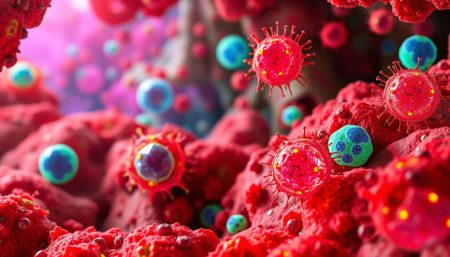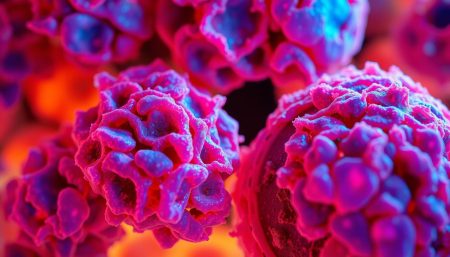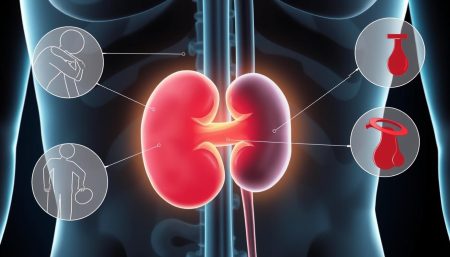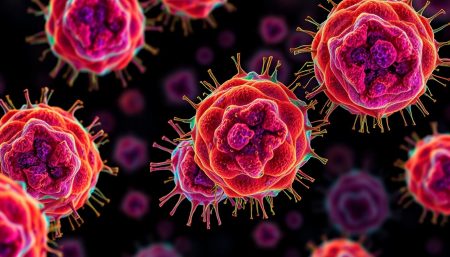Being vigilant about kidney cancer can save lives. Knowing the kidney cancer early signs and symptoms is key. This helps catch the disease early, when treatments are more effective.
But, kidney cancer symptoms can be very subtle. They might not be noticed until the cancer has grown. So, it’s crucial for people at risk to watch for these signs and act early.
In this article, we explore the confusing world of symptoms. We mix empathy with medical knowledge. This helps you spot kidney cancer warning signs that need attention. Our goal is to educate and support those facing cancer.
Key Takeaways
- Recognizing kidney cancer early signs is critical for early intervention and successful treatment.
- Identifying kidney cancer symptoms requires a thoughtful blend of medical knowledge and attentive self-awareness.
- Health-conscious adults should be aware of the varied signs of kidney cancer.
- Preventative vigilance aligns with actionable knowledge to promote better outcomes.
- Empowering patients and families with information on kidney cancer warning signs is central to our mission.
Understanding Kidney Cancer: A Primer
Exploring kidney cancer starts with the kidneys’ crucial role. They filter waste and make urine. They also help control blood pressure and balance electrolytes. It’s important to know how serious kidney cancer can be and its effects on health.
Kidney cancer has several types, with Renal Cell Carcinoma (RCC) being the most common. It makes up about 90% of cases. Other types, like Transitional Cell Carcinoma and Wilms Tumor, are less common and often affect children. As cancer grows, it can harm kidney function, causing renal cancer symptoms.
Going from noticing symptoms to getting a kidney cancer diagnosis is tough. Symptoms include blood in urine, back pain, and weight loss. But, many symptoms are silent and only found through screenings or tests for other issues.
- Being careful about noticing changes in your body is crucial for early detection.
- New imaging and biomarker tests have made kidney cancer diagnosis more accurate.
- Knowing the stage and grade of kidney cancer is vital for treatment and outlook.
Understanding the emotional and physical impact of kidney cancer is key. It highlights the need for support and informed medical care. With ongoing research, there’s hope for better treatments, offering hope to those affected.
Recognizing the Main Symptoms of Kidney Cancer
Early detection of kidney cancer is key to effective treatment. Spotting the main symptoms can lead to quick medical help. We’ll explore the main signs, from blood in the urine to unexpected weight and appetite changes.
A Closer Look at Hematuria
Hematuria, or blood in the urine, is a clear sign of kidney cancer. It can look like red, pink, or cola-colored urine because of red blood cells. It’s important to tell it apart from infections or benign tumors for early treatment.
Persistent Back Pain and Discomfort
Persistent back pain in the flank area often points to kidney cancer. Unlike usual back pain, this pain stays the same and can get worse over time.
Unintended Weight Loss and Appetite Changes
Unexplained weight loss and changes in eating habits can hint at kidney cancer. These signs show up when the cancer is advanced, affecting metabolism and appetite. It’s a sign the body is fighting hard.
It’s crucial to watch for any of these symptoms together and see a doctor for a full check-up.

| Symptom | Description | Related Conditions |
|---|---|---|
| Hematuria | Blood in the urine | Urinary tract infections, stones, kidney cancer |
| Persistent Back Pain | Constant pain in the flank area | Muscular injuries, herniated discs, kidney tumor |
| Weight Loss | Significant, unintentional weight reduction | Metabolic syndromes, gastrointestinal issues, kidney cancer |
Knowing these signs of kidney cancer and noticing any lasting health changes is crucial. It could mean a big difference in how the disease is managed.
Early Warning Signs of Kidney Cancer
It’s important to watch for kidney cancer early signs to catch it early. Kidney cancer often grows quietly, so knowing these signs is key to getting help fast.
Some kidney cancer warning signs look like symptoms of milder problems. For example, feeling very tired or suddenly losing your appetite might seem like stress. But, they could also mean kidney cancer, making kidney cancer screening crucial.
- Blood in urine (hematuria) which may be visible or microscopic
- Constant pain on one side of the back, just below the ribs but not associated with injury
- An unexplained weight loss accompanied by fever without a known infection
- High blood pressure or a condition of hypertension that’s difficult to control
- Swelling in ankles and legs
- Persistent fatigue that doesn’t improve with rest
| Symptom | Common Misdiagnoses | Reason for Kidney Cancer Screening |
|---|---|---|
| Blood in Urine | Urinary Tract Infection | Early identification of abnormal kidney function |
| Persistent Back Pain | Muscle Strain | Excludes injury-related causes |
| Unexplained Fever | Common Viral Infection | Checks for hidden infections and tumors |
This table shows how symptoms of common issues can also be kidney cancer warning signs. It’s hard to spot and understand these signs, which is why we need to keep learning about kidney cancer screening.
Spotting these signs early and talking to doctors about tests can really help. It can lead to better treatment and a better chance of recovery.
What Are Kidney Tumor Symptoms?
Spotting kidney tumor signs early can greatly improve treatment success. This part explores the key symptoms of a kidney tumor. It offers important details for seeking medical help on time.
Palpable Mass in the Abdominal Area
A noticeable abdominal mass is a key sign of a kidney tumor. This mass can be felt during a physical check-up. It’s a strong sign that needs more tests.
Variations in Urination
Changes in urination, like more frequent or urgent trips to the bathroom, can hint at kidney issues. These changes are important. They show how a tumor might affect the urinary system.
Swelling of Legs and Ankles
Swelling in the legs and ankles can be a sign of a kidney tumor. It happens when the body can’t manage fluid balance well. This symptom is important. It shows how a tumor might affect kidney function.
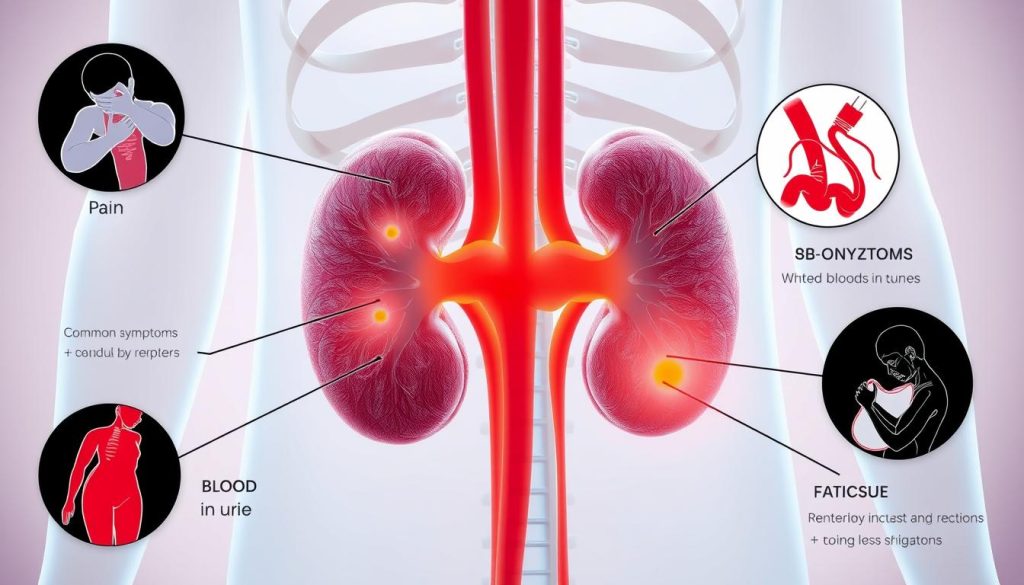
It’s vital to understand and watch for these symptoms if you’re worried about your kidneys. If you notice any, see a doctor right away. This ensures early detection and treatment.
The Overlooked Kidney Cancer Early Signs
When we talk about kidney cancer early signs, some details might not seem important at first. These signs, often seen as minor, can actually point to kidney cancer. Spotting them early can help in getting the right treatment sooner.
Many people don’t connect their body changes with kidney cancer signs and symptoms. They might think they’re just minor health issues. It’s important to pay attention to any ongoing or unusual changes in your body.
- Fatigue that isn’t alleviated by rest
- Low-grade fever persistent over weeks without an infection
- Sudden increase in blood pressure or heart rate
These symptoms might seem harmless and could be blamed on lifestyle, stress, or getting older. But, when it comes to kidney cancer, it’s crucial to take notice and see a doctor.
Being more alert and getting regular health checks is key, especially if you have a family history of cancer or other risk factors. Catching kidney cancer early is vital for effective treatment. So, knowing and acting on these early signs can save lives.
Risk Factors and Kidney Cancer Screening
Knowing the kidney cancer risk factors helps find people who need more kidney cancer screening. This section talks about how new tech helps catch cancer early. It shows how old ways of finding risks meet new tech.
High-Risk Groups for Kidney Cancer
Some things increase your chance of getting kidney cancer. These include genes you’re born with, smoking, being overweight, and some chemicals. These factors make different groups at different risks. This makes it key to screen people in a way that fits their risk.
Importance of Regular Screening
For those at high risk, regular checks can save lives. Finding kidney cancer early makes treatments work better. People caught early often need less surgery and live longer.
Advancements in Kidney Cancer Diagnostics
New tech has made finding kidney cancer easier. Things like MRI and CT scans help spot tumors early. Also, new biomarkers help doctors find cancer fast and accurately. These changes make finding cancer less scary and help patients heal faster.
| Advancement | Impact on Diagnosis |
|---|---|
| Enhanced Imaging Techniques | Higher accuracy in tumor detection; ability to distinguish between benign and malignant masses. |
| Biomarker Development | Early identification of molecular markers linked to kidney cancer, facilitating swifter intervention strategies. |
| Genetic Screening | Identifies individuals at heightened risk due to familial cancer syndromes, guiding preventive measures. |
Kidney Cancer Warning Signs
Exploring kidney cancer reveals the importance of recognizing subtle symptoms. These signs, though common, might signal a serious issue like kidney cancer. It’s vital to pay attention to them.
Fatigue and General Malaise
Feeling tired all the time and a general feeling of being unwell are signs of kidney cancer. This tiredness doesn’t get better with rest. It’s a deep, ongoing tiredness that affects daily life.
This feeling of being unwell is hard to explain but is a key warning sign.
Fever of Unknown Origin
Fever can be a sign of many things, but an unexplained fever is a red flag. It could mean kidney cancer. A low-grade fever that lasts is especially concerning if you’re also feeling tired or losing weight.
Anemia and Other Blood-related Symptoms
Anemia, or low red blood cells, is a common symptom of kidney cancer. It leads to fatigue, making it hard to do everyday tasks. Anemia can also cause paleness, dizziness, or shortness of breath.
These symptoms are important to watch for, especially if you’re experiencing other kidney cancer signs.
Kidney Cancer Signs and Symptoms
Knowing the kidney cancer signs and symptoms is key for early detection. This section gives a detailed look at the symptoms of kidney cancer. It uses information from the whole article to help those worried about this disease.
- Blood in urine (hematuria), which may appear pink, red or cola-colored
- Persistent pain on one side of the back
- Unexplained weight loss and loss of appetite
- Fatigue and general weakness
- Anemia and ongoing fever without infection
- Palpable lump in the abdominal area
- Swelling of legs and ankles
The symptoms listed may not always mean kidney cancer. They can also point to other health issues. Still, if you notice any of these signs, it’s best to talk to a doctor.
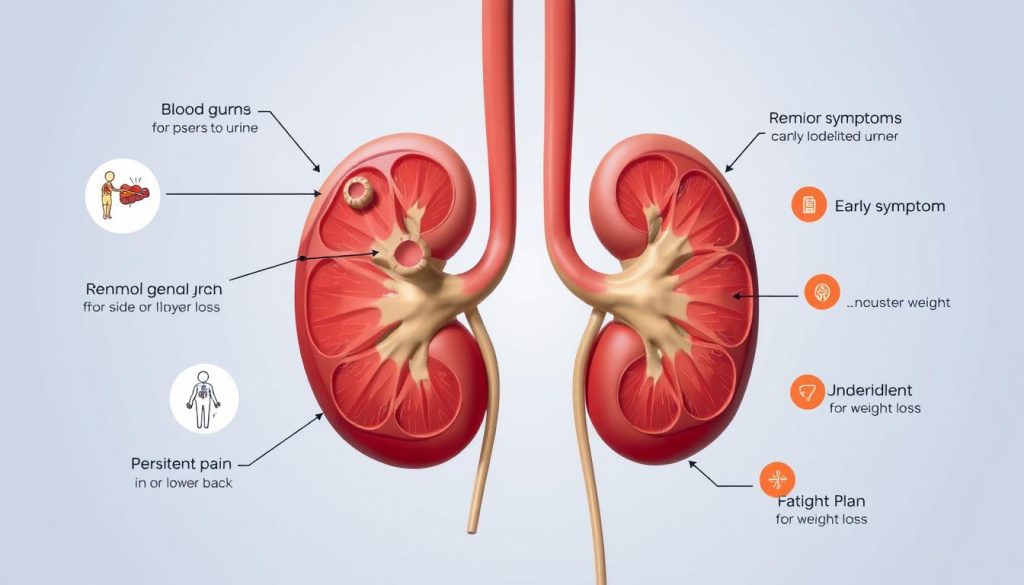
It’s also vital to think about your risk factors. These include family history and lifestyle choices. Regular health checks are crucial for catching kidney cancer early.
If you or someone you care about is showing these symptoms, especially if they’re severe or last a long time, get medical help. This is important to check for kidney cancer signs and symptoms or other health problems.
Interpreting the Signs: When to Seek Medical Advice
Figuring out if you have kidney cancer can be tricky. Symptoms might look like other health issues. It’s key to know when to talk to a doctor for medical advice. This could lead to an early kidney cancer diagnosis.
Distinguishing Between Kidney Cancer and Other Conditions
It’s important to know the signs that point to kidney cancer. Symptoms like blood in the urine or flank pain could mean kidney stones or infections. If these signs don’t go away, getting medical advice is crucial for a correct diagnosis.
The Role of Early Detection in Successful Treatment
Early detection is key to treating cancer well. Finding kidney cancer early can lead to better treatment options. Regular check-ups and knowing your body’s signs are important for those at risk.
Navigating the Path to a Kidney Cancer Diagnosis
Getting a kidney cancer diagnosis involves several steps. This includes blood tests, imaging, and sometimes a biopsy. Knowing this process can help reduce stress and prepare everyone involved.
Deciding when to get medical advice can be tough. But it’s a big step towards health. If you or someone you know has symptoms, don’t wait to see a doctor.
Renal Cancer Symptoms: Beyond the Basics
Renal cancer symptoms can be complex and varied. It’s common for people to mistake these signs for less serious issues. Knowing the details is key for catching the disease early.
Early signs might include a lingering fever, constant tiredness, or feeling unwell without reason. These symptoms are often mistaken for viral infections or just being tired.
As the disease progresses, symptoms can become more obvious. Some people might see their blood pressure go up without a clear cause. Others might notice vision changes due to hormones from tumors. Understanding these subtle signs is vital for those at risk.
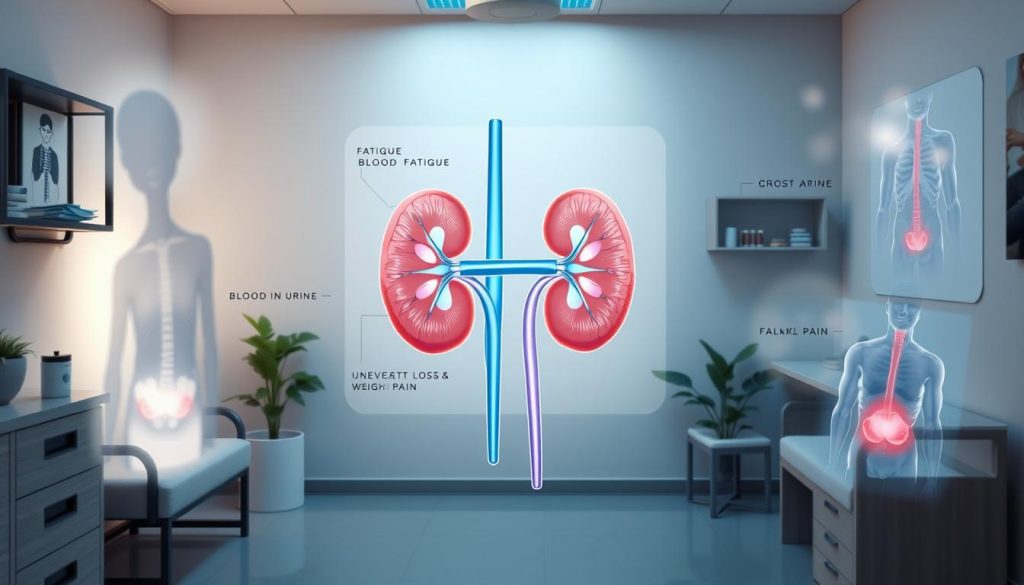
Talking to doctors and using resources like UpToDate’s in-depth guide on renal cancer helps. This information helps identify symptoms and guides the next steps towards a diagnosis.
| General Symptom | Possible Renal Cancer Indicator |
|---|---|
| Persistent Pain on Side or Lower Back | Directly affected by tumor location in the kidney |
| Unexpected Weight Loss | Metabolic demands of the tumor |
| Night Sweats | Body’s response to the cancer |
| Swelling in Ankles and Legs | Impaired kidney function affecting fluid regulation |
Being watchful for these symptoms and seeing a doctor for any unusual changes is crucial. It’s important to rely on trusted sources like recent medical studies to stay updated.
Complications and Secondary Symptoms of Kidney Cancer
Kidney cancer is complex and affects many areas of life. It goes beyond the initial diagnosis. Patients face kidney cancer complications, metastatic kidney cancer, and the psychological effects of cancer.
Impact of Kidney Cancer on Overall Health
Kidney cancer complications touch many parts of the body. Patients might see high blood pressure or a drop in kidney function. These changes make treatment harder and affect daily life.
They show why patients need full medical care and support during treatment.
Understanding Metastatic Kidney Cancer
Metastatic kidney cancer means the cancer has spread to other parts of the body. This stage is tough for treatment and managing complications. Common places for cancer to spread include the lungs, liver, and bones.
Each place adds new symptoms that can lower a patient’s quality of life.
Psychological Symptoms and Quality of Life Considerations
The psychological effects of cancer are deep and wide. They affect a patient’s mental and emotional health a lot. From the start of diagnosis to treatment and possible recurrence, patients may feel anxious, depressed, and stressed.
| Complication/Impact | Physical Effects | Psychological Effects |
|---|---|---|
| Kidney Function Decline | Fluid retention, electrolyte imbalances | Anxiety about health and future |
| Metastasis to Bones | Pain, fractures, mobility issues | Depression, fear of loss of independence |
| Metastasis to Lungs | Breathing difficulties, persistent cough | Stress about breathing issues, existential concerns |
This broader view of kidney cancer shows why we need a care approach that covers both body and mind. It helps create a better treatment plan focused on the patient.
Latest Research on Kidney Cancer Symptoms and Detection
The field of kidney cancer research is always changing. New detection advancements are making cancer care more personalized and effective. Studies show promising biomarkers and imaging techniques that could change how we find and treat kidney cancer early.
New imaging and molecular biology techniques are leading the way. They improve diagnosis accuracy and help find kidney cancer early. Early detection is key for effective treatment.
Genetic markers are a big area of research. Scientists are looking into how these markers can predict kidney cancer behavior. This could lead to more tailored treatments, moving towards personalized medicine.
- Development of non-invasive testing methods
- Enhanced imaging techniques for precise tumor localization
- Identification of biomarkers for early-stage kidney cancer
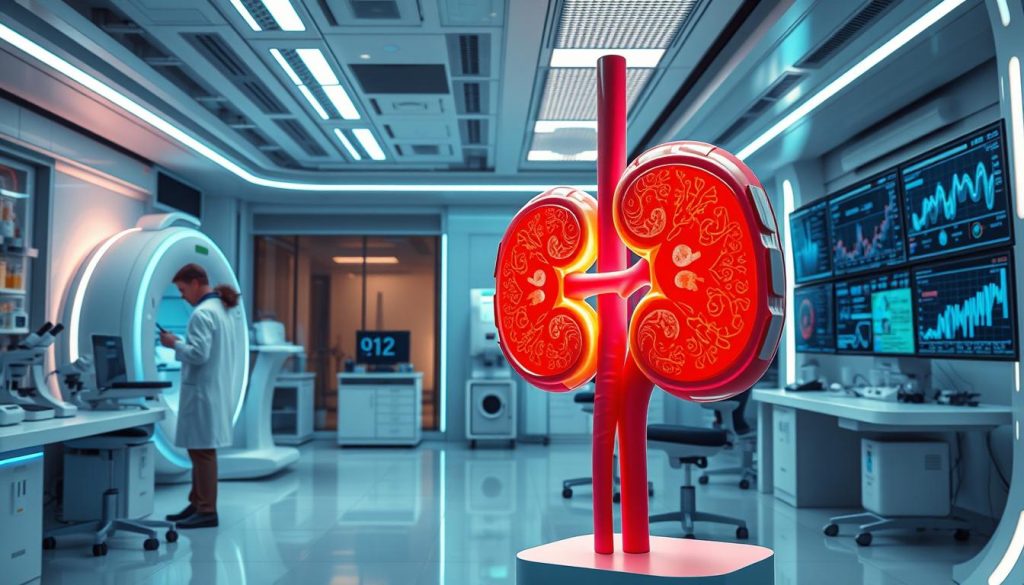
| Advancement | Impact | Current Status |
|---|---|---|
| Non-invasive blood tests | Reduces the need for invasive diagnostic procedures | Under clinical trials |
| 3D imaging technologies | Offers detailed visuals of tumor size and spread | Being integrated into diagnostic processes |
| Molecular targeting therapies | Improves treatment specificity and effectiveness | Increasingly used in personalized treatment plans |
These detection advancements offer hope to patients and families. They signal a move towards less invasive and more effective kidney cancer management. Early detection and personalized treatment are key, aligning with today’s healthcare trends.
As kidney cancer research keeps evolving, it’s crucial for patients and healthcare providers to stay updated. New medical technologies could improve outcomes and give hope to those with kidney cancer.
Conclusion
We’ve learned a lot about keeping our kidneys healthy. Knowing the kidney cancer early signs and the need for kidney cancer screening is key. We’ve seen many signs of kidney cancer, from small changes to big ones. Spotting these signs early can help catch the disease before it’s too late.
It’s also clear how important it is to listen to our bodies. Regular check-ups and knowing the warning signs help us fight this serious illness. With the right information and medical care, there’s hope for those facing kidney cancer.
Our journey to better health is a team effort. The stories and facts we’ve shared show the strength of the human spirit. Let’s keep supporting each other and using our knowledge to fight for health. For more on cancer signs, check out the early warning signs of colon cancer.
FAQ
Q: What are some early signs and symptoms of kidney cancer that individuals should be aware of?
A: Early signs of kidney cancer include blood in the urine and back pain. You might also notice unexplained weight loss, fatigue, and a lump in your abdomen. Remember, these symptoms can also mean other health issues. So, it’s important to see a doctor for a proper diagnosis.
Q: How can understanding kidney cancer help with early detection?
A: Knowing how kidneys work and the types of cancer can help you spot unusual health changes. This knowledge can lead to quicker diagnosis and better treatment options.
Q: Why is it important to recognize the main symptoms of kidney cancer, such as hematuria and persistent back pain?
A: Recognizing symptoms like blood in the urine and back pain is key. They often signal a problem early. Catching these symptoms early can lead to better treatment chances.
Q: What early warning signs of kidney cancer might be easily dismissed or mistaken for other conditions?
A: Signs like occasional pain in the side or feeling generally unwell might be overlooked. These can be mistaken for less serious issues. So, it’s crucial to pay close attention to your body’s signals.
Q: Can kidney tumor symptoms like changes in urination or swelling of the extremities be definitive indicators of cancer?
A: Symptoms like changes in urination or swelling can hint at kidney tumors. But, they don’t always mean cancer. It’s important to get a medical check-up to find out the cause.
Q: What are some overlooked kidney cancer early signs that should not be ignored?
A: Signs like a persistent slight fever or feeling unwell without reason should not be ignored. Also, changes in blood pressure are important. These symptoms need to be discussed with a doctor.
Q: Who should consider kidney cancer screening and when is it critical?
A: People with a family history of kidney cancer or who smoke should get screened regularly. For those at high risk, early screening is critical. It can greatly improve treatment success.
Q: What are kidney cancer’s warning signs that indicate the need for immediate medical attention?
A: Signs like sudden, severe back pain or a fast-growing abdominal mass need immediate care. Also, severe changes in urination or unexplained weight loss with blood in the urine are urgent. Seek medical help right away.
Q: For someone experiencing kidney cancer signs and symptoms, what steps should they take towards a diagnosis?
A: If you notice signs of kidney cancer, start by talking to your primary care doctor. They might send you to a specialist like a urologist. Tests, imaging, and possibly a biopsy will follow to confirm the diagnosis and plan treatment.
Q: How can the latest research and advancements in detection impact those with kidney cancer symptoms?
A: New research and detection methods, like better imaging and biomarkers, offer hope. They can lead to earlier, more accurate diagnoses. This means more effective treatments and better patient outcomes.












